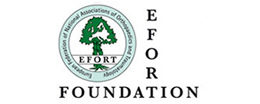
During the EFORT Implant & Patient Safety Initiative inaugural workshop on 21 January 2020 in Brussels with key decision makers and stakeholders, EFORT presented this new concept and discussed issues around development, introduction and clinical application of implants with a focus on arthroplasty-related topics.
This initiative is strongly consistent with EFORT’s strategic pillars (e.g. harmonisation of guidelines and standards, influencing European health policy) and we believe that EFORT and its stakeholders will take a leading role on this important matter.
During the workshop, three working groups were created in order to discuss the conception of concepts for further action and communication, including patient information, collaborative position papers, proposals for training and education. One of the goals was, to develop recommendations on all three workshop themes, which can then be distributed to stakeholders (i.e. clinicians, manufacturers, regulators, health politics, patients) in order to provide information on important implant-related topics where clinical need has been identified.
Since the workshop took place in January 2020, these three working groups have been actively working on advancing the aims of this initiative:
- Group I: Introduction of innovations.
- Group II: Off-label use, mix & match and clinical consequences of re-certification.
- Group III: Collection and Analysis of Implants Retrieved during Revision.
IPSI-sessions at the VEC 2021:
- EFORT Implant Safety Initiative: Introduction Of Innovations In Arthroplasty And Failure Analysis
Wednesday 30 June | Channel 1 | 09:30-10:30 AM CET - EFORT Implant Safety Initiative: Off-Label Use And Mix & Match
Wednesday 30 June | Channel 1 | 11:00-12:00 AM CET

Group I: Introduction of innovations
Led by Søren Overgaard and Thomas M. Grupp.
As an outcome from the workshop, a first White Paper was drafted with the title “Introduction of innovations in artificial joint arthroplasty: Recommendations from the EFORT Implant and Patient Safety Initiative” and shared with all workshop participants for review and feedback.
The revised manuscript was then made available to all EFORT National Members in order to also obtain their feedback. In parallel, a survey was conducted to get an overview of the current opinions and mind-sets in relation to implant and patient safety, as well as the clinical introduction of medical devices under the Medical Device Regulation, i.e. the new EU regulation for assessment and registration of medical products.
The second draft of the White Paper as well as the survey results were presented in October 2020 during the first Virtual EFORT Congress (VEC 2020).
The Chairs of this working group have designated a Scientific Committee who have put in place a process for a more intensive and detailed consensus initiative involving EFORT National Members as well as International Expert Delegates.
The Objectives of an “European Consensus on Medical & Scientific Research Requirements for the clinical introduction of orthopaedic joint replacement devices” are:
- To focus on patient safety & performance requirements.
- To maintain innovation and further optimisations of orthopaedic medical products & workflows within the boundaries of MDR 2017/745.
- To establish guidance based on suitable pre-clinical & clinical evaluation methodologies (state of the art 2021).
Consensus shall be obtained by a broad dialogue of international orthopaedic surgeons, academic research institutes and experts in biomechanical, medical and scientific research from laboratories and orthopaedic device manufacturers, notified bodies, national member societies, European Patient Associations. The Consensus process is passes the following steps:
- Preparation of EFORT European Consensus Systematic Reviews by International Expert Delegates, work on assigned research questions, outline of a Draft Consensus Statements resulting in exchange of the drafts.
- A hybrid EFORT European Consensus Meeting to present a draft Consensus statement, discussion and work in subspecialty groups to finalise a Consensus.
- Vote on Consensus at the end of the EFORT European Consensus Meeting.
- Consolidation & submission for publication EFORT European Consensus papers.
We thank the following people for their involvement in the 1st EFORT European Consensus on “Medical & Scientific Research Requirements for the Clinical Introduction of Orthopaedic Joint Replacement Devices”.
Scientific Committee
- Ashley Blom | United Kingdom
- Luca Cristofolini | Italy
- Eduardo García-Rey | Spain
- Alexander Giurea | Austria
- Bernd Grimm | Luxemburg
- Marcus Jäger | Germany
- Dennis Janssen | The Netherlands
- Philippe Massin | France
- Francesco Siccardi | Switzerland
International Experts
- Hassan Achakri | Switzerland
- George Babis | Greece
- Francesco Benazzo | Italy
- Dario Bergadano | Switzerland
- Massimiliano Bernardoni | Italy
- Marc Bohner | Switzerland
- Barbara Bordini | Italy
- Joshua Bridgens | United Kingdom
- Vincenzo Carbone | Italy
- Justin Cobb | United Kingdom
- José Cordero-Ampuero | Spain
- Marcel Dreischarf | Germany
- Georg Duda | Germany
- Matthias Fink | Germany
- John Fisher | United Kingdom
- Karlmeinrad Giesinger | Switzerland
- Faris Haddad | United Kingdom
- Alister Hart | United Kingdom
- Petra Heesterbeek | The Netherlands
- Bernardo Innocenti | Belgium
- Volkmar Jansson | Germany
- Christian Kaddick | Germany
- Franz Kainberger | Austria
- Johan Kärrholm | Sweden
- Jan Philipp Kretzer | Germany
- Ricardo Larrainzar-Garijo | Spain
- Christoph Lohmann | Germany
- Anne Lübbeke-Wolff | Switzerland & United Kingdom
- Fabio Mancino | Italy
- Bernard Masson | France
- Richard Mayer | Switzerland
- Claudia Mazza | United Kingdom
- Michael Morlock | Germany
- Caroline Mouton | Luxemburg
- Rob Nelissen | The Netherlands
- Maria Angeles Pérez Ansón | Spain
- Gwendolen Reilly | United Kingdom
- Claude Rieker | Switzerland
- Sabine Rusch | Germany
- Ronja Schierjott | Germany
- Christoph Schilling | Germany
- Arndt-Peter Schulz | Germany
- William Taylor | Switzerland
- Francesco Traina | Italy
- Walter Van der Weegen | The Netherlands
- Marco Viceconti | Italy
- Jan Victor | Belgium
- Henning Windhagen | Germany
- Matthias Woiczinski | Germany
- Ina Wüstefeld | Germany

Group II: Off-label use, mix & match and clinical consequences of re-certification
Led by Luigi Zagra and Keith Tucker.
After a very good initial presentation of the topic during the workshop, it was agreed that there is urgent need to advise clinicians on how to handle different situations, during which – especially in revision cases – products from industry, which might be necessary in order to replace parts of implants (i.e. liners) are not available anymore. If there is only a need for partial exchange, it might be less complicated and dangerous for patients to use other components than the original ones.
This working group is working on developing a draft on “EFORT-Recommendations for Off-label use and mix & match in hip and knee arthroplasty”. This manuscript is circulated to the workshop participants with the goal of publication.
We thank the following people for their involvement in drafting the EFORT Recommendations for Off-label use, Mix & Match and Mismatch in Hip and Knee Arthroplasty:
- Hassan Achakri | Switzerland
- Neil Betteridge | United Kingdom
- Esther-Patricia Cónsul-Tejero | Germany
- Jean-Alain Epinette | France
- Nils Hailer | Sweden
- Per Kjaersgaard-Andersen | Denmark
- Jan-Philippe Kretzer | Germany
- Jörg Lützner | Germany
- Francesco Marchetti | Italy
- Peter Muenger | Switzerland
- Michaela Münnig | Germany
- Rob Nelissen | The Netherlands
- Philippe Neyret | France
- Luca Orlandini | Switzerland
- Gilles Pasquier | France
- Stefan Ruck | Germany
- Xavier Sarabia | United States
- Raisa Sattar | United Kingdom
- Keith Tucker | United Kingdom
- Cees Verheyen | The Netherlands
- Katharina von Strünsee | Germany
- Dieter Wiek | Germany
- Luigi Zagra | Italy
- Josef Zündorf | Germany

Group III: Collection and Analysis of Implants Retrieved during Revision
Led by Michael Morlock and Enrique Gomez-Barrena.
Failure of a joint replacement procedure is a complex topic. Historically treatment failures were frequently related to implant design and material. Today, arthroplasty registries have helped to identify problematic designs and materials and consecutively remove them from the market step by step.
Contemporary analyses of registry results focus on the surgical process and individual patient characteristics, since these factors in combination with the proper procedure, dominate the clinical success in the patient. Yet problems related to the implant itself still exist and comprise a serious concern in the European society, heralded by occasional media interpretation of problems with new implants and medical devices.
The goal of this working group is to develop a common approach to the collection and analysis of retrieved implants as well as the investigation of a possible relation to the failure of the treatment. A consensus on how to collect and document the analysis of the retrieved implants will also contribute greatly to the process of introducing new implants into the market, which is addressed by group I of this initiative. Finally, the post market surveillance of companies monitoring the safety of their products will also benefit from such a standardized approach. A draft on “EFORT recommendations on storage and documentation of failed implants” will be shared with the workshop participants for review and feedback.
We thank the following people for their involvement in drafting these EFORT Recommendations:
- Atilla Bulent |Turkey
- Dario Bergadano |Switzerland
- Joshua Bridgens | United Kingdom
- Esther-Patricia Cónsul-Tejero | Germany
- José Cordero-Ampuero | Spain
- Antti Eskelinen | Finland
- Li Felländer-Tsai | Sweden
- Michael Georg | Germany
- Alister Hart | United Kingdom
- Theodore P. Kormas | Greece
- Justyna Kozik-Jaromin | Germany
- Katre Maasalu | Estonia
- Jan Noyez | Belgium
- Luca Orlandini | Switzerland
- Rihard Trebše | Slovenia
- Gijs Van Hellemondt | The Netherlands
- Dieter Wirtz | Germany
The First European Consensus Conference took place as a hybrid meeting from 22 to the 23 June 2021 with people participating onsite in Dresden, Germany, and virtually via their computers.
It was jointly organized by the chairs of the Working Group I ‘Introduction of innovations’ and Working Group II ‘Off-label use, mix & match and clinical consequences of re-certification’ and kindly hosted by the Universitätsklinikum Carl Gustav Carus at their premises in Dresden, Germany.
The schedule between the 22 and 23 June 2021 was as follows:

Group I: Consensus on “Medical & Scientific Research Requirements for the Clinical Introduction of Orthopaedic Joint Replacement Devices”
- Tuesday, 22 June 2021 (full day): Draft Consensus statements: Presentation and discussions
- Wednesday, 23 June 2021 (morning): Consensus voting
Full programme of Group 1 | PDF document | 9 pages | 825kb
Draft Consensus statements are available via this Dropbox link

Group II: Consensus on “Off-label use, Mix & Match and Mismatch in Hip and Knee Arthroplasty”
- Wednesday, 23 June 2021 (afternoon): Presentation of the draft manuscript and voting
Full programme of Group 2 | PDF document | 1 page | 340kb

Dial-in links to connect to each meeting as well as the links to vote for the consensus questions can be found on top of the programme for each day and group will be shared with participants separately shortly before the conference.
We look forward to your participation and two full days of fruitful discussions and outcomes.
For any questions, please do not hesitate to contact sabrina.marchal@efort.org
For further information or questions about the
EFORT Implant & Patient Safety Initiative, please contact: eu@efort.org .


